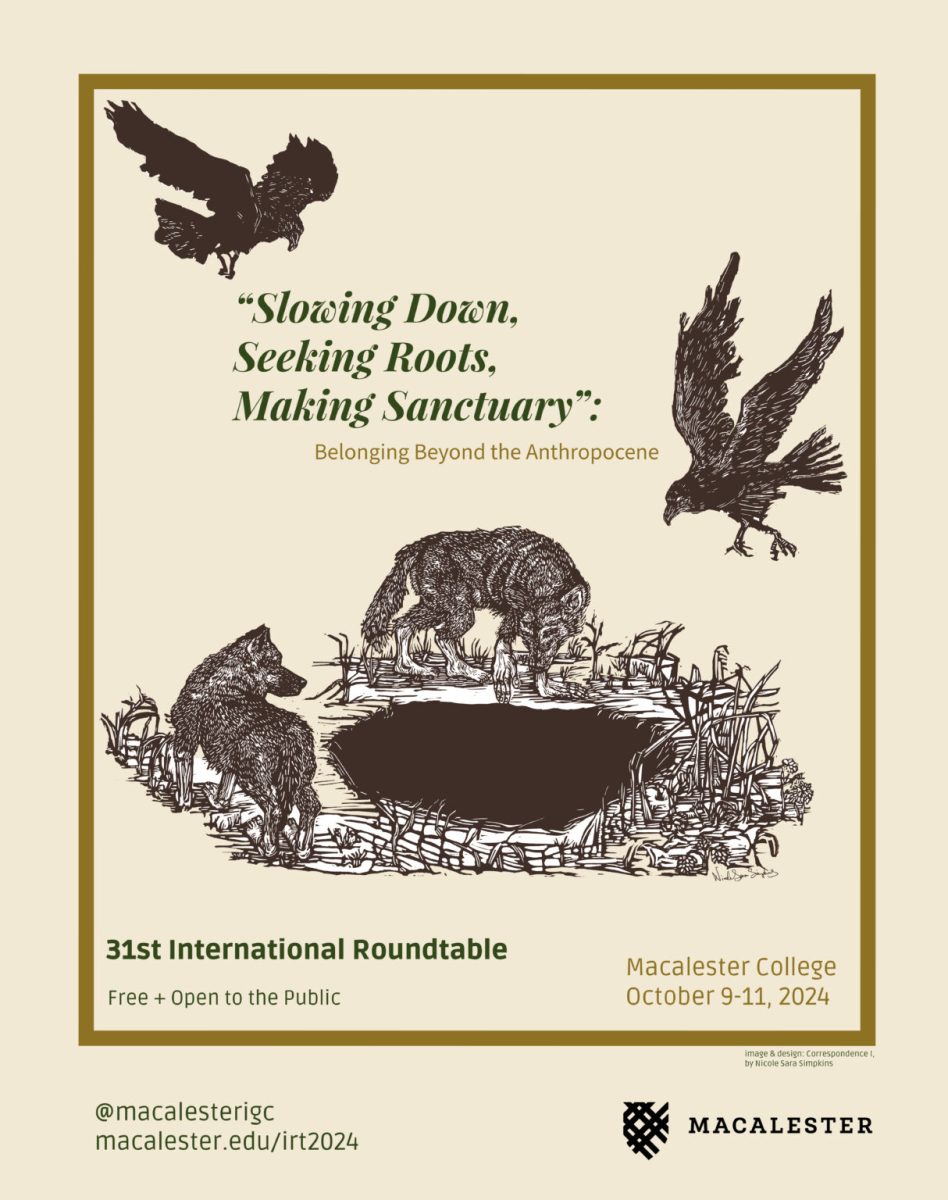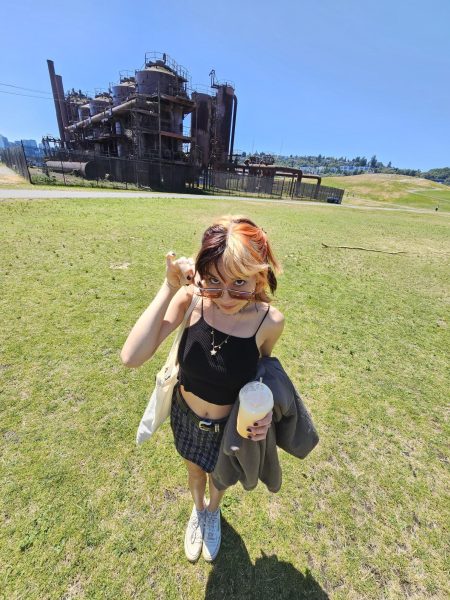From Oct. 9-11, Macalester will host its 31st annual International Roundtable (IRT). The IRT is a Macalester tradition that involves guest speakers and the Macalester community in a series of workshops, exhibits and presentations. The event encourages students, professors and community members to engage in dialogue about a topic chosen by the Kofi Annan Institute for Global Citizenship (KAIGC) every year.
This year’s topic, “Slowing Down, Seeking Roots, Making Sanctuary: Belonging Beyond the Anthropocene” derives from a quote by Nigerian speaker, activist, writer and professor Dr. Bayo Akomolafe. As a renowned posthumanist who challenges our human-centric approach to collective justice and activism, his words represent the theme of making space for rest.
In his 2020 essay “A Slower Urgency,” Dr. Akomolafe said:
“Slowing down is not about reducing one’s speed but about lingering in the places we are not used to. Seeking out new questions. Becoming accountable to more than what rests on the surface. Seeking roots… making sanctuary.”
The IRT will commence on Wednesday, Oct. 9 at 4:30 p.m. in the Kagin Ballroom with the opening keynote by Dr. Akomolafe: “For Those Spirited Away: Making Sanctuary as a Vocation of Exile in Restless Times.”
The IRT was almost unable to get Dr. Akomolafe as a keynote speaker. Although he is currently in the U.S. for a residency, Dr. Akomolafe lives in India, and is set to fly back to India right after the IRT.
“We got really lucky with this one,” Dean of the KAIGC Hui Wilcox said. “So I believe he’s going to be a draw among our local community as well — not just students, faculty [and] staff at Macalester. Macalester… because of this, becomes a reason for a gathering of artists and thinkers within our broader community.”
In her second year as Dean of the KAIGC, Wilcox is spearheading the IRT. Every year, the IRT Theme Selection Panel chooses the theme out of a pool of proposals submitted by students, faculty and staff. Wilcox described this year’s theme of belonging as a “container” or framework that includes aspects from all the proposals.
“It basically means, as a community, how can we be with each other? With the world that confronts us with all kinds of complicated questions?” Wilcox said.
As chair of the IRT Organizing Committee, Khant Wai Yan ’25 has also been a leader in organizing the roundtable.
“There are a lot of things happening on campus, a lot of things that people are disagreeing with, a lot of things that we’re not happy with,” Wai Yan said. “And I think this roundtable theme of not just the Anthropocene, but beyond that — nature, animals — [helps us] remember that it’s not just a human world.”
Having been involved with the IRT since the fall of 2022, Wai Yan has seen the roundtable evolve over time. This year, with eight student panels, the IRT is more student-led than in previous years. In the future of the roundtable, Wai Yan hopes that more students, especially international students, get more involved.
“As a campus full of activist scholars… people should have these conversations on campus,” Wai Yan said. “And hopefully the roundtable is not the only yearly, annual event that is discussing these questions, but other events also spring up.”
These conversations about belonging, conflict and rest will play a large role in the second keynote, “Solidarity Programs in the Anthropocene”, which features Media and Cultural Studies professor John Kim. This presentation will take place on Thursday, Oct. 10 at 11:30 a.m. in Weyerhaeuser Boardroom.
Known for his research related to the Anthropocene, Kim’s keynote will present the work he has done over the last eight years about resistance in communities along the Mississippi River.
“A lot of my work… has been about forms of resistance to the Anthropocene organized by communities, especially frontline communities, that have been coming up with solutions that have been variously reparative, imaginative, creative [and] communal,” Kim said. “They propose alternative ways of thinking about how to live with other humans in the face of increasing climate chaos and scarcity.”
Macalester students have been involved in Kim’s research as well. In a 110-day study away program, Kim and his classes have sailed and camped along the Mississippi River in hand-built boats during various semesters.
Meira Smit ’25 was one of the students in this course, and will be co-leading two student panels: “Sitting with the Prairie: Doing Nothing in Multispecies Community” with Joel Sadofsky ’25 and “Sow and Tell: Planting Seeds of Change in Environmental Storytelling” with Stella Gardner ’25. These panels and all other student-led panels will meet in Markim Hall’s Davis Court.
Smit’s two panels exemplify how this year’s IRT will incorporate non-traditional presentations, as they will invite students to sit still in nature and participate in storytelling as an act of political activism.
“We’re always clocked in,” Smit said. “My purpose of being a human is not to work and to do labor… Some of the talks and sessions can really embody that and inspire new ways to relate with rest.”
To Smit, the IRT is only the starting point. She hopes that the conversations from the panels also spark tangible change in how we structure our time in academic and workplace communities at Macalester and beyond.
“I don’t think any type of symbolic representation is meaningful unless we have some real, structural changes,” Smit said. These changes could take shape as a restructured workweek, more days off or dedicated break periods.
The IRT will close with a participatory art exhibit in the Janet Wallace Fine Arts Center on Friday, Oct. 11, facilitated by Wilcox and Chair of the Art and Art History department Megan Vossler.
By incorporating interactive, creative and interdisciplinary panels with academic presentations, this year’s roundtable will serve as an opportunity for the greater Macalester community to engage with the world in our daily lives.
“Come not only for the speakers, who we normally think about as experts, but also think about how we can all contribute as co-creators of knowledge,” Wilcox said.
Registration for the IRT and the full schedule are located on the IRT’s webpage. Those registered will receive a printed brochure of the IRT and have a chance to win a signed copy of Dr. Akomolafe’s book.
An an interdisciplinary project, the IRT is made possible by a variety of departments, offices, faculty, staff and community members.







